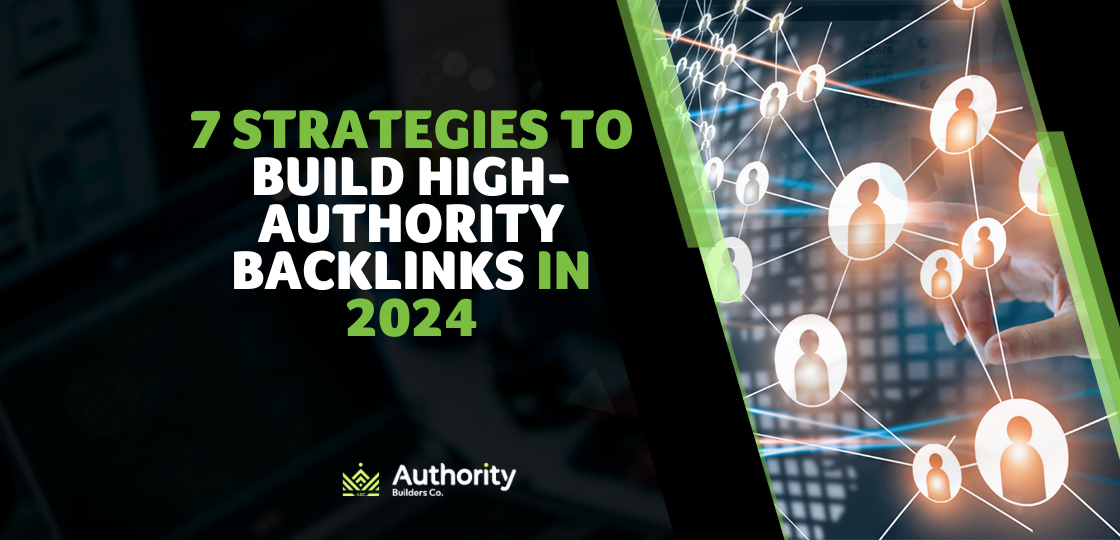
Backlinks are a critical factor in determining which websites and pages are ranked first in search engine results pages (SERPs).
However, not all backlinks are created equal. Search engines are more likely to value high-authority backlinks over low-authority ones.
But what do we mean by high authority? And how do you get these backlinks?
This article aims to answer all these questions and more.
Contents:
What Are High Authority Backlinks?
7 Ways to Build High Authority Backlinks
- Find out how your competitors build high-authority backlinks
- Become an expert source
- Find unlinked brand mentions
- Fix broken links
- Publish high-quality content
- Use the skyscraper technique
- Hire a link-building agency
What Are High-Authority Backlinks?
High-authority backlinks come from websites that are well respected in their industry.
Google uses several criteria to decide what makes a website authoritative. We list some of those criteria below.
However, a word of warning: we don’t know for certain how Google and other search engines determine high-authority backlinks—it’s a closely guarded secret.
But there are several ways we can infer what these criteria are, including:
🕵️ Google documentation leak: Recently, several documents were leaked from Google’s Content Warehouse API. This gave the search engine optimization (SEO) industry clues about how the search engine ranks websites. Among the most important findings was that Google does have some sort of score that measures website authority—although no detail was given as to what contributed to the score.
🕵️ SEO tools: Tools like Ahrefs, SEMRush, and Moz all attempt to emulate search engine ranking algorithms because understanding the search performance of websites, pages, and links helps guide SEO. These tools use many of the factors listed below to gauge website authority fairly accurately. Each has a slightly different approach and assigns its own score—Moz calls it domain authority (DA), while Ahrefs calls it domain rating (DR).
🕵️ SEO experts: Well-known SEO experts like our founder Matt Diggity constantly perform tests to see what impacts Google search results.
Let’s take a look at what those criteria are:
Relevancy
What a high-authority backlink constitutes, depends on the industry the websites giving and receiving the backlinks relate to.
That’s because if Google thinks a backlink isn’t relevant to your content or business, then it will ignore it. Your search engine rankings will get little or no benefit.
As an example, let’s look at guitar lessons website yourguitaracademy.com.
A similar website, happybluesman.com, references one of Guitar Academy’s lessons. This backlink is highly relevant to its industry.

Another backlink pointing to yourguitaracademy.com comes from sales funnel builder SaaS, getwpfunnels.com.

This time, the website represents a completely different industry. It has linked to Your Guitar Academy to use it as an example of how to implement website popups.
This link is unlikely to be as valuable as the one from Happy Bluesman, even though getwpfunnels.com has a much higher DR.
Backlink profile
A website’s backlink profile comprises all the links and domains that point to it. It takes into account the number of backlinks and domains, as well as their quality.
| ℹ️ What are high-quality backlinks?
There’s a lot of crossover between what makes a backlink high authority and what makes it high quality. The main difference is that a high-quality backlink doesn’t necessarily need to come from a website with a high DR. |
In other words, the quality of the backlinks pointing to your own website partly depends on the quality of links pointing to the linking websites.
For example, according to Ahrefs, yourguitaracademy.com has around 4,500 backlinks from 582 domains. Its traffic is around 4,600 monthly visitors.

Compare that to guitartricks.com, which has around 187,000 backlinks from 3,600 domains, and around 105,000 monthly visitors.

Therefore, a backlink from guitartricks.com is likely to be higher authority than one from yourguitaracademy.com.
Locality
This is pretty straightforward. Links from websites located in the same country as you, are more valuable than those from sites based abroad.
Recent
The more recently a page has been published, the more authoritative it is.
This has wider implications for your website’s SEO. It means that over time, your authority score could gradually decrease if you don’t continue to gain backlinks.
This makes ongoing link building critical to keeping or growing your organic traffic.
Dofollow
Dofollow is an HTML tag that tells Google to consider a link when ranking a page. Nofollow links, on the other hand, tell Google not to do this.
Nofollow links are used in many situations where you do not want a page to rank or where you don’t want Google to see the page that you are linking to. Examples include affiliate links and links to online forms.
High authority backlinks are usually dofollow—otherwise, they won’t be able to pass on a ranking benefit.
Here’s how to root out rogue nofollow links:
- Right-click on a webpage in your browser.
- Select “inspect”—this will open the page’s source code.
- Hit “Ctrl F.”
- Type “nofollow.”
- Each nofollow link will be highlighted in yellow.
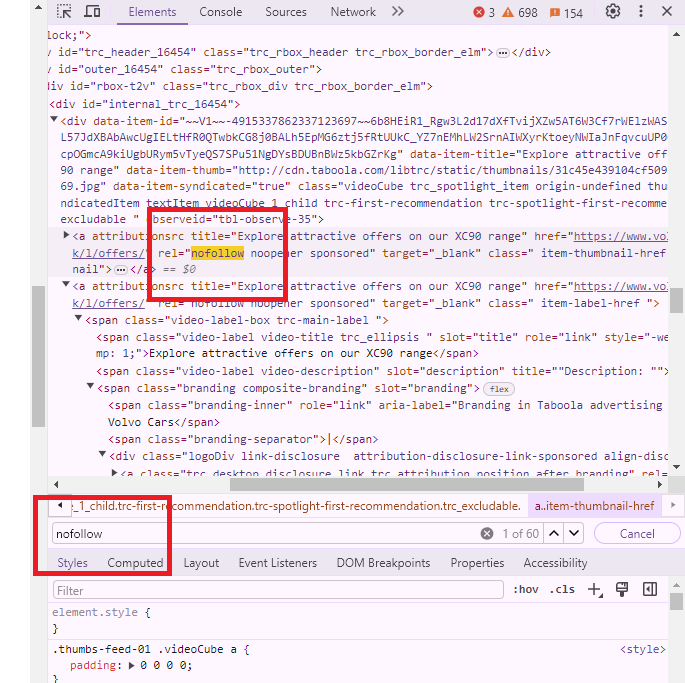
Contextually relevant anchor text
Anchor text is the written words that contain a hyperlink.
Keyword-rich anchor text that is relevant to the surrounding content will result in a more valuable link than one that is not.
The example below shows you what we mean. This lesson posted on Guitar.com was created by one of Your Guitar Academy’s teachers. The anchor text forms part of the sentence and tells the reader they will be taken to Your Guitar Academy’s free guitar lessons if they click it.
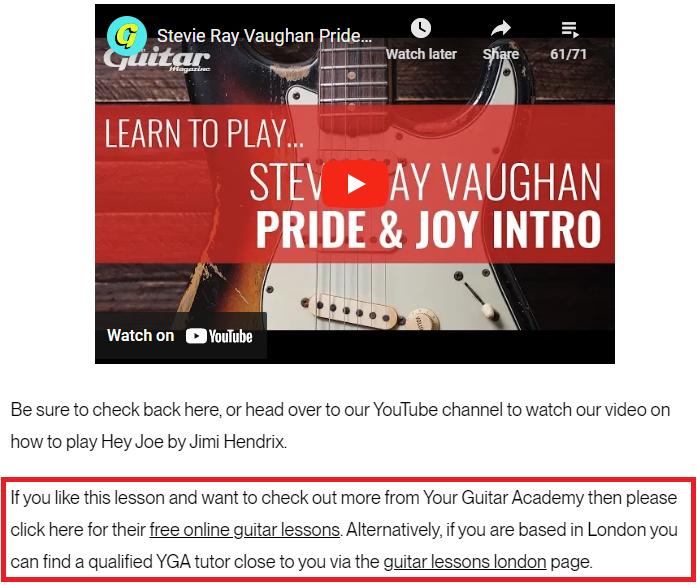
However, in the next example, the anchor text gives no information about where the link will take you. This is unhelpful for users and search engines, so it’s less likely to be considered high authority.
 Placed in context
Placed in context
High-authority backlinks need to be relevant to the surrounding text. The two examples mentioned above are about guitar lessons, so linking to Your Guitar Academy makes sense.
But if the page was explaining how to hire a lawyer and it suddenly abruptly linked to guitar lessons, then the link would probably be ignored by search engines.
Placed in content
Finally, high-quality links appear in the website’s content, not in the sidebars or in the header or footer sections.
Links that do not form part of the content itself tend to represent spammy link-building practices or poor website design, so Google often ignores them.
How to Build High-Authority Backlinks
Now you know what high-authority backlinks are and why they are important. This section lists the techniques you can use to gain them for your website.
1. Find out how your competitors build high-authority backlinks
This isn’t a link-building technique—it’s more a way of seeing what works and finding opportunities.
The idea is that a high-authority website that links to your competitors will also likely link to yours. You’ll want to target these websites as part of your own link-building strategy.
At Authority Builders, this strategy forms part of our backlink audit process when working with new clients.
How do we do it? We could look at competitor websites and manually see who is linking to them. But a much quicker approach is to use an SEO tool.
In this example, we use Ahrefs, but you can also use SEMRush, Moz, and many others to get similar results. We’re going to use yourguitaracademy.com in our example once again.
1. Open the Site Explorer in Ahrefs and type in your domain name.
 2. Click “Link intersect” in the left sidebar.
2. Click “Link intersect” in the left sidebar.

3. Type the names of your competitors’ websites into the fields and click “Show link opportunities.”

4. You’ll be presented with a list of linking domains, along with how many times the site links to each of your competitors. You can click on the number of links and inspect each one individually.

5. Finally, look for good opportunities. For example, midlifeguitar.com links to both guitarlessons.com and guitartricks.com. The Guitar Lessons links all lead to a resource page where the site owner lists valuable lessons that his readers might be interested in.

Your Guitar Academy might be able to reach out to the site owner and ask whether some of their lessons could be included here, too. Or they could create something to fill any gaps in the resource pages.
2. Become an expert source
News websites are one of the best sources of high-authority backlinks out there. Getting your company covered by journalists is a great way to build links with these websites.
Digital PR is one route to doing this. It involves trying to get your business into the news by saying or doing something that journalists will want to tell their readers about.
This could include:
📢 Interesting company news.
📢 Commenting on current events.
📢 Providing expert insight or advice.
📢 Hosting an interesting event.
📢 Producing something useful.
📢 Giving away something for free.
📢 Creating something entertaining.
Once you’ve helped a journalist, there’s a good chance that they’ll come back to you again next time they need expert insight on your industry.
But there are a few challenges to digital PR:
⚠️Coming up with ideas that journalists would want to cover can be difficult.
⚠️Even if you do come up with a good idea there’s no guarantee journalists will cover it.
⚠️Producing quality content and assets for digital PR is time and resource-intensive.
It’s often a good idea to hire a digital PR agency if you want to get results. However, these businesses tend to charge high fees.
If you do decide to reach out yourself, here are some tips for a successful PR campaign:
📢 Research the publications you target: Understand the website’s target audience and industry before you reach out to them. Aim to produce quality content that you know its readers will be interested in.
Avoid a scattergun approach where you target a broad range of less relevant websites—you’ll be wasting your time and that of the journalists you contact. Instead, focus on tailoring your campaign to a few super-relevant publications.
📢 Build relationships: PR is all about building relationships with publications. Before you even begin planning your first campaign, reach out to relevant journalists to introduce yourself and explain how you can help them.
You might not get a response, but doing this makes it more likely that your campaigns will be covered. That’s because the journalist may recognize you from your introduction and will already be aware of your expertise.
📢 Have something valuable to offer: Journalists are inundated with companies trying to get themselves into the news. To get coverage, you need to give them something that they or their readers will find genuinely useful. If you keep sending them obvious publicity stunts or content that doesn’t interest their readers, then they will simply block your emails.
📢 Do the work for the journalist: Journalists are usually busy with tight deadlines. If you make it easy for them to cover your campaign, then it’s more likely that they will do so.
Try to include:
- A written report (press release).
- Supporting stats or figures.
- Additional quotes and viewpoints.
- High-quality images.
- Where to find additional information.
📢 Act fast: If you aim to comment on current events, you must contact journalists quickly. News moves fast and if you leave it too long, then the press agenda will move on. Even worse, one of your competitors could beat you to it.
Try to respond to news events on the same day—ideally within hours of something happening. To do so, you need to have someone who can scan the news every day with enough time at hand to react to it.
📢 Follow up: As already mentioned, journalists are busy people, so don’t be surprised if you don’t get a response. You may have to follow up several times. The timing of your follow-up depends on the urgency of your campaign. If you’re commenting on a breaking story, then it’s a good idea to follow up within a few hours. However, if your campaign is for an event taking place in a few months, then following up within a few days is fine.
Remember to:
- Be polite and helpful.
- Remind the journalist why their readers will be interested in your story.
- Ask whether they need more information.
- Don’t be pushy. If they reject your story, try to find out why and keep it in mind for next time.
Try a media source platform
One way to easily connect with the media is to use platforms like Qwoted or Connectively. These websites allow journalists and other writers to post requests for quotes, experiences, or expert opinions.
You can scroll through these requests and try to find one you can respond to. If your response is good enough, the journalist will publish it and link to your website.
Here are some tips for using these platforms:
- Act fast: Like with normal press link building, time is an important factor. The slower you respond, the less chance there is of your quote getting published.
- It’s a numbers game: Journalists on media source platforms tend to be inundated with responses. Often there will be someone who responds quicker, has more expertise, or has a better answer. The success rate of link builders responding to Connectively requests is around 1 in 10.
- Only respond if you can add value: Don’t respond unless you can add value—you’ll be wasting your time. For example, let’s say the request is for a professional guitar teacher to provide tips for teaching kids to play. Just because you played in a band in high school doesn’t mean you have the level of authority and expertise the journalist is looking for.
| Need help building high-authority links with PR campaigns? Check out our digital PR service. We secure links with the largest news media websites to position your brand as a market leader. |
3. Find unlinked brand mentions
High-authority sites may talk about your brand or products but fail to link to you.
This is an open goal in the world of link building. You can simply contact the website owner and ask them to link to you.
Most will be happy to do so as it adds context to their content and improves their user experience.
There are two ways to find unlinked brand mentions:
Use Google
You can use Google search operators to find unlinked mentions. Here’s how:
1.Type “intext:” followed by your brand name. In this example, we’re going to use our own.

2. Scroll down through the results and try to find examples where your brand name has been used but was not linked. Remember, we’re looking for high-authority backlinks, so focus on news websites or well-known brands.

3. Visit the page. hit ctrl+F, type your brand name into the search bar, and then hit enter.

4. The brand mention will be highlighted for you. Decide whether it’s worth contacting the website owner. In this case, the mention is part of a guest post written by our founder. There’s a chance they will link to us—but it’s not a natural in-content mention, so we’ll probably keep searching for better opportunities.
Use an SEO tool
1. In this example, we’re going to use Ahrefs. Once you have your account set up, visit the Content Explorer.

2. Type your brand name and choose “In Content” from the dropdown menu. We suggest using speech marks to ensure Ahrefs only shows exact match results.
 3. Click the “Highlight Unlinked” box and type your domain name.
3. Click the “Highlight Unlinked” box and type your domain name.

4. As we’re looking for high-authority backlinks, it’s also worth sorting the list by domain rating.

5. You can export the list, but it’s better to go through the results one by one to try and find a good linking opportunity.
Take a look at the excerpts on the left and find one that mentions your brand. In this case, we found an article in Techbullion that seems promising.

6. Click on it and try to find instances where you’re mentioned. In this case, there is indeed an unlinked mention, which may make it worth our while to reach out to the website owner to add a link.
Broken links usually occur when the article a page links to is taken down, although there are several other reasons it could happen. This usually creates a 404 error for any user who clicks on the broken link.
These are good opportunities for you to gain links. You can simply reach out to the site owner and ask them whether they would like to link to your high-quality content instead.
Broken link building is effective because it solves a problem for the site owner and improves their user experience.
You need to use an SEO tool to find broken link-building opportunities (doing it manually will take forever!).
Here’s how to do it with Ahrefs:
First, choose a competitor website that has high domain authority to search for broken links. Let’s take a look at https://www.guitartricks.com/
Go to Ahrefs’ Site Explorer and type the target site’s domain address.
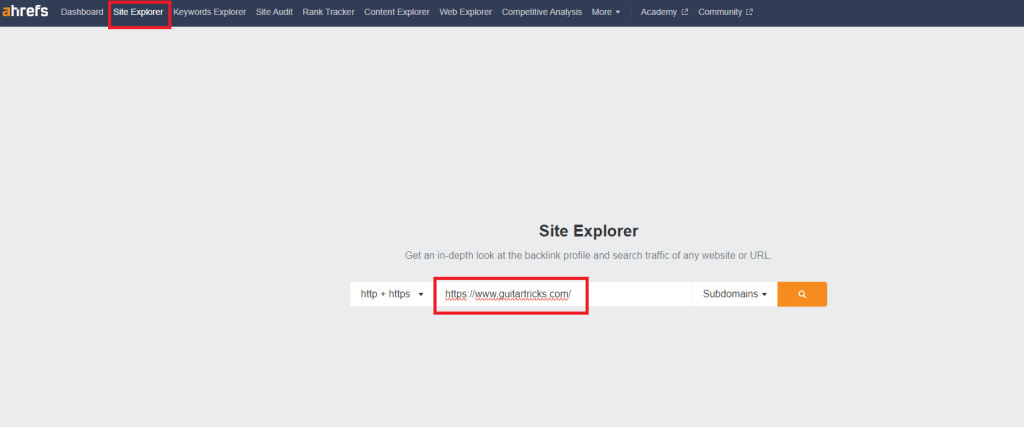
In the sidebar menu, click “Broken Backlinks.”

In the filters, choose “Dofollow” and “In content” under “Backlink type.” Don’t forget to click “Show results.”

Ahrefs will show you a ton of broken links pointing to Guitar Tricks. The top result is for a DR 78 website—this is likely to be a high-authority backlink opportunity.

To be sure, click through to the page and try to find the link. In this case, the content explains how rock band The Beatles always considered each other’s feedback when writing songs.
Click on the link to check whether it is broken. Sure enough, this takes us to a 404 error on the Guitar Tricks website.
Now that you’ve confirmed this is a genuine broken link-building opportunity, reach out to the site owner and offer to write a replacement article on how the Beatles went about writing songs together that they can link to.
5. Publish high-quality content
One of the main reasons website owners or blog post writers link to other pages is because it adds value to their content or makes it more trustworthy.
If you produce quality content that is original, well-researched, professionally produced, and most importantly, useful for your industry, then you are more likely to generate high-authority backlinks.
For example, Your Guitar Academy has created a guide to adjusting your guitar intonation—this is a technical process that even most expert guitar players can’t do.
The page features three videos explaining everything guitarists need to know about adjusting intonation on the main electric guitar types.
This content is so good that it has gained a backlink from DR 91 website WikiHow!
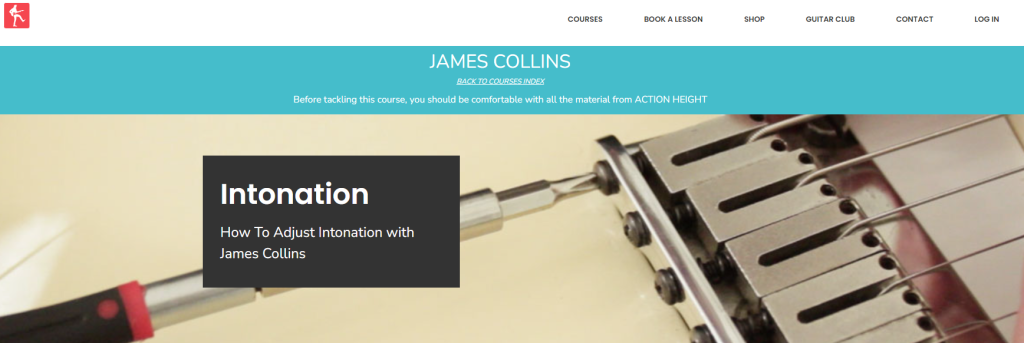
It’s a good idea to hire professionals to produce your content. This ensures readers trust it and encourages high-authority site owners to share it with their target audience.
For example, to produce this page Your Guitar Academy probably hired:
- A copywriter to write the words on the webpage.
- A video editor to shoot and edit the footage.
- A web developer to build and design the page.
Linkable assets
Linkable assets is another term for content, but it tends to encompass a wider range of formats. Think useful apps and tools, online courses, or downloadable e-books.
For example, Fender Play, another guitar lessons platform, provides a free online tuner. This has a whopping 865 links from 173 domains, including one from the DR 85 Neocities.org.
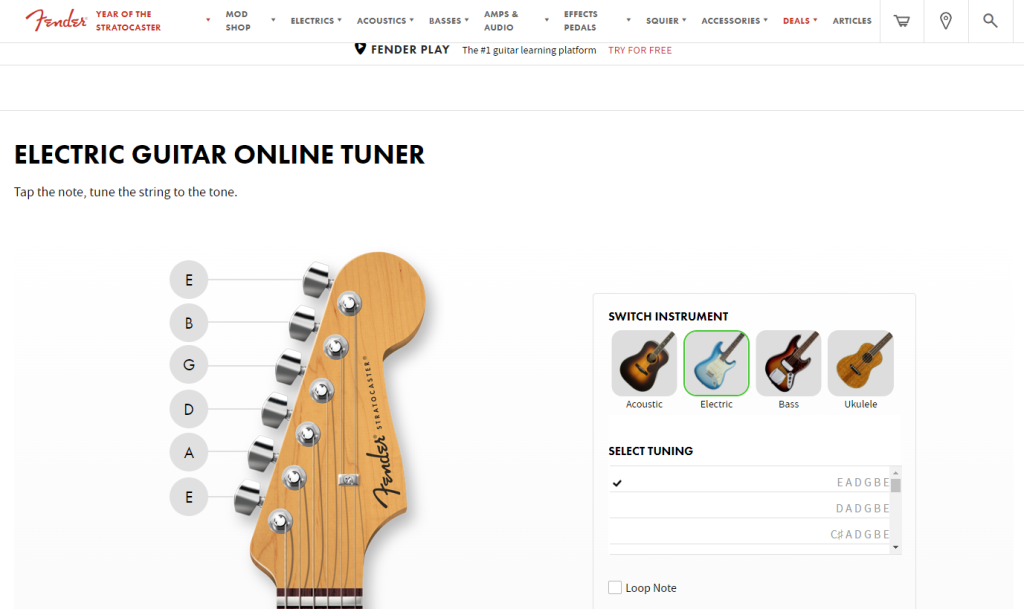
The reason is clear—this is a high-quality tuner that is completely free to use. Guitar websites are bound to recommend this valuable resource to their target audience.
6. Use the skyscraper technique
This technique was created by SEO guru Brian Dean. The idea is to look at the type of content that draws backlinks for your competitors.
Once you have determined this, you can create your own version that is 10x better. Your aim is to create content that towers above the rest in terms of quality, value, and originality—hence the name.
This means that your content is more likely to draw links from high-authority websites.
Here’s how to find opportunities for skyscraper content with Ahrefs:
- First, choose a competitor website that you think may have a lot of high-authority backlinks. Let’s use Guitar Tricks again.
- Go to the Ahrefs Site Explorer and type your target domain. Under “Pages,” click on “Best by links.”

3. Ahrefs will present you with data on which web pages on the Guitar Tricks site get the most backlinks. Look through it to see whether you can find any pages that get more than 50 links.
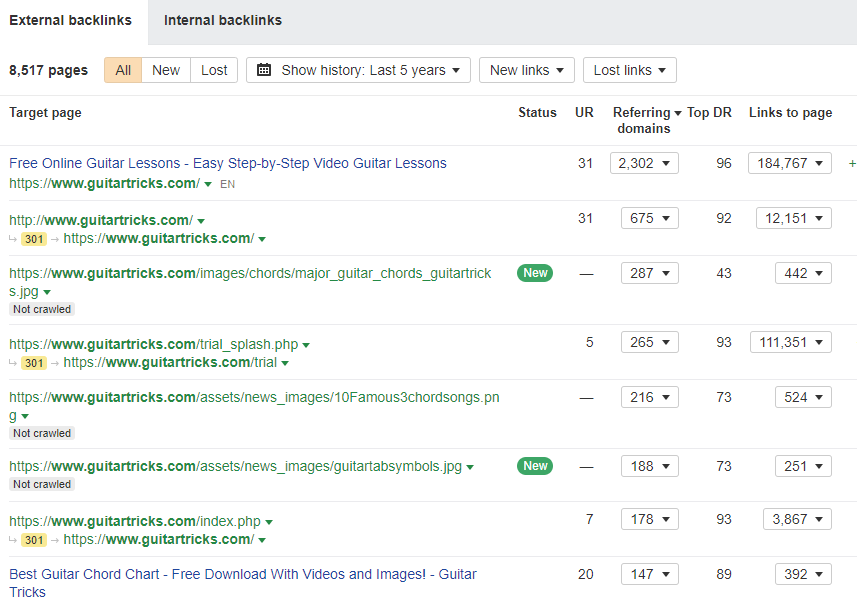
4. If you find one, take a look at it and ask yourself whether you could improve or add value to the kind of content. For example, this guide on guitar tab symbols gets 406 links from 92 domains.
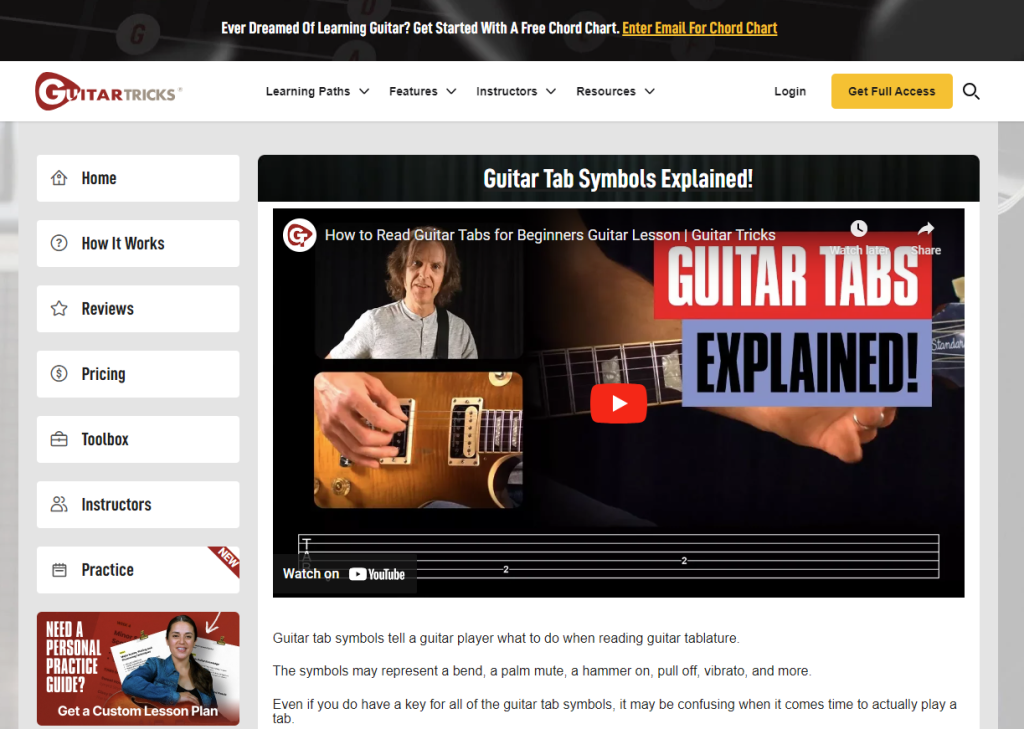
It’s a good article, with a short video and a brief explanation of the different techniques.
But is there anything you could do to make it better? For example, could you provide videos showing readers how to play each technique? Or perhaps show examples of how each is used in well-known songs?
5. Once you’ve created your competitor-beating content, reach out to the site owner who features your competitor’s content and suggest they link to yours instead.
Point out the reasons why your content is better and how it will help add value for their readers. You can also ask whether there is anything else they would like you to do to improve the piece further.
If your content really is a skyscraper, then you’ll find that your backlinks increase, while those of your competitors begin to fall.
7. Hire a link-building agency
You might have noticed from this article that building high-authority backlinks is hard. That’s why we recommend you hire an agency to build them for you.
Link-building agencies exist to build high DA backlinks for their clients.
There are several benefits to using link-building agencies:
✅ They take all the time-consuming admin and production work off your plate, allowing you to focus on your broader SEO strategy.
✅ They know what good link-building opportunities look like.
✅ Link-building agencies care about their reputations. They won’t build any spammy links.
✅ They can build high-authority backlinks faster and more successfully because they live and breathe link building every day.
Build High-Authority Backlinks with Authority Builders
Authority Builders is one of the world’s leading link-building agencies. Since 2016, we’ve been helping our clients reach the top of search results.
All customers signed up for our ABC Plus and ABC Platinum managed link-building packages get a free custom link-building strategy that includes:
💡Anchor text analysis: How good and varied is the anchor text used in your backlinks?
💡Link velocity analysis: How fast should you build links?
💡Authority diagnosis: How can you improve your site’s authority?
With Authority Builders, you can relax knowing that experienced professionals are handling your link building. To find out how we can help you, contact us today and book a free consultation.

 Placed in context
Placed in context